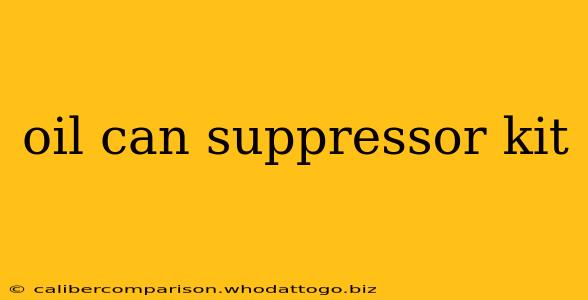The allure of a quieter firearm is undeniable, leading many shooters to explore the world of suppressors. While the term "oil can suppressor" might conjure images of makeshift devices, the reality is far more nuanced. This guide delves into the complexities of oil can suppressor kits, exploring their history, functionality, legality, and the crucial considerations before purchasing or building one.
Understanding Oil Can Suppressors: History and Design
The term "oil can suppressor" is often used generically to describe a type of suppressor built from readily available materials, historically utilizing repurposed oil cans. These designs, while sometimes effective at reducing sound, generally lack the precision engineering and materials of commercially manufactured suppressors. They often featured simple baffles constructed from stacked metal discs or perforated sheets within a cylindrical housing, usually an oil can.
Crucially, it's important to note that homemade suppressors often carry significant legal risks. The legality of building and owning a suppressor varies drastically by location, and unauthorized manufacture or possession can result in severe penalties, including hefty fines and imprisonment.
The Allure and Risks of DIY Suppressor Kits
The appeal of building your own suppressor kit, particularly one based on the "oil can" design, stems from cost savings and the perceived ease of construction. However, this simplicity masks considerable dangers:
- Ineffective Sound Suppression: DIY suppressors, especially those built using rudimentary designs and materials, often provide inadequate sound reduction. This can lead to hearing damage for both the shooter and those nearby.
- Safety Hazards: Poorly constructed suppressors pose a significant risk of malfunction, potentially resulting in serious injury or even death. The pressure generated by a firearm's discharge is immense, and improperly designed or assembled suppressors may fail catastrophically.
- Legal Ramifications: As previously mentioned, the manufacture and possession of unregistered suppressors are strictly regulated and heavily penalized in most jurisdictions. The penalties associated with illegal suppressor ownership are far more severe than those for other firearm-related offenses.
- Accuracy Issues: The potential for inconsistent baffle alignment and improper construction can significantly impact a firearm's accuracy.
Legal Considerations: Navigating Suppressor Regulations
Before even considering a suppressor, thorough research into local, state, and federal regulations is paramount. The legal landscape surrounding suppressors is complex and varies significantly depending on your location. This includes understanding:
- Registration Requirements: Many jurisdictions mandate the registration of suppressors with law enforcement agencies.
- Licensing Procedures: Obtaining the necessary permits and licenses can be a lengthy and complicated process.
- Background Checks: Comprehensive background checks are usually required before a suppressor can be legally purchased or owned.
- Import/Export Restrictions: Regulations concerning the import and export of suppressors also vary greatly.
Safer Alternatives: Commercially Manufactured Suppressors
Instead of risking legal and safety issues with an oil can suppressor kit, consider the many commercially manufactured suppressors available. These suppressors are designed and tested to meet stringent safety and performance standards. They offer:
- Superior Sound Suppression: They are engineered to provide optimal noise reduction, protecting hearing and reducing noise pollution.
- Enhanced Safety: They are meticulously constructed to withstand the high pressures of firearm discharge, minimizing the risk of malfunction.
- Legal Compliance: They are manufactured and sold in accordance with all applicable laws and regulations.
- Variety of Calibers and Applications: Commercially available suppressors are designed for a wide range of firearms and calibers, providing options to suit individual needs.
Conclusion: Prioritize Safety and Legality
While the idea of a DIY oil can suppressor kit might seem appealing, the risks significantly outweigh the benefits. The potential for injury, legal repercussions, and ineffective sound reduction make it a highly inadvisable option. Always prioritize safety and adhere to all relevant laws and regulations. If you're interested in suppressor use, explore the wide range of safe, legal, and high-performance commercially available suppressors. Remember, responsible firearm ownership requires a comprehensive understanding of both the technology and the legal frameworks governing its use.

